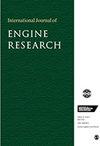关于气体添加剂对火花点火发动机中甲烷非催化部分氧化作用影响的实验研究
IF 2.1
4区 工程技术
Q2 ENGINEERING, MECHANICAL
引用次数: 0
摘要
本研究调查了气体添加剂(H2、CO、N2、H2O 和 CO2)对火花点火发动机中甲烷未催化部分氧化的影响。比较了每种添加剂的燃烧阶段、排气成分和性能结果。由于热效应,稀释成分(N2、H2O 和 CO2)阻碍了甲烷的燃烧,其中 CO2 的燃烧延迟最为明显。加入 CO2 和 H2O 后,由于水气转换反应平衡的改变,CO 和 H2 的产量分别增加。相反,燃料添加剂(H2 和 CO)通过提高火焰的启动和传播速度来增强燃烧,从而减少未燃烧的 CH4 并增加功。在所有实验中都检测到了微不足道的烟尘排放,而在 CO 添加剂实验中,氮氧化物排放显著增加,这归因于氮氧化物形成反应的加速。这项综合分析为了解天然气和沼气等甲烷基混合气体在使用内燃机进行部分氧化时的燃烧和重整特性提供了深入的见解。本文章由计算机程序翻译,如有差异,请以英文原文为准。
Experimental study on the effects of gas additives on uncatalyzed partial oxidation of methane in a spark-ignition engine
This study investigated the effects of gas additives (H2 , CO, N2 , H2 O, and CO2 ) on the uncatalyzed partial oxidation of methane in a spark-ignition engine. The combustion phases, exhaust compositions, and performance outcomes of each additive were compared. The dilution components (N2 , H2 O, and CO2 ) impeded methane combustion owing to their thermal effects, with CO2 exhibiting the most pronounced delay in combustion. The addition of CO2 and H2 O led to increased CO and H2 yields, respectively, owing to shifts in the water gas shift reaction equilibrium. In contrast, fuel additives (H2 and CO) enhanced combustion by increasing the flame initiation and propagation speed, resulting in reduced unburned CH4 and increased work. Negligible soot emissions were detected for all the experimental cases, whereas NOx emissions increased significantly in the CO additive experiments, which was attributed to accelerated NOx formation reactions. This comprehensive analysis provides insights into the combustion and reforming characteristics of methane-based mixed gases, such as natural gas and biogas, during partial oxidation using internal combustion engines.
求助全文
通过发布文献求助,成功后即可免费获取论文全文。
去求助
来源期刊

International Journal of Engine Research
工程技术-工程:机械
CiteScore
6.50
自引率
16.00%
发文量
130
审稿时长
>12 weeks
期刊介绍:
The International Journal of Engine Research publishes high quality papers on experimental and analytical studies of engine technology.
 求助内容:
求助内容: 应助结果提醒方式:
应助结果提醒方式:


